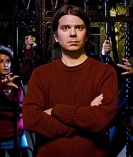 |
|
Robert Smith?

|
|
No, the question mark is not a typo, but rather how Robert Smith? distinguishes himself in a world of Google searches. Though the name is unique in itself, it is Robert's research that truly marks him as a creative and innovative mathematician.
Robert has never been interested in simple arithmetic, and says "I still can't figure out the tip in a restaurant." Though his interest in mathematics was originally piqued in high school when math class moved beyond calculations to more abstract concepts, it is the power of applied mathematics to solve real-world problems that has held his attention. Using what Robert describes as the "language of math," you can translate a biological problem into mathematical terms and create a mathematical model. "You can then analyze your model and come to a mathematical conclusion, which can then be translated back into the biology," says Robert. "This conclusion may be something that wouldn’t be obvious just by thinking through in the real world, but translating it into mathematics gives you access to logic and rigour."
Given this penchant for solving real-world problems, it seems ironic that Robert is best known for his research in an imaginary field: zombies. In 2009, he co-authored a paper detailing a mathematical model of a zombie outbreak that attracted a storm of media attention.1 Yet this research has more applications in reality than are readily apparent. The researchers had to create a model for an infection outbreak without relying on any existing models, an important practice in preparation for the outbreak of new diseases and epidemics. "By modelling zombies, we learn about the process of dealing with unfamiliar biology," says Robert. Robert will further explore the topic in his upcoming book Braaaiiinnnsss: From Academics to Zombies, due out October 2011.
The zombie paper evolved from Robert's ongoing research into diseases. His primary research focus lies in HIV modelling. Along with his research team from the University of Ottawa, he developed a mathematical model to examine how best to eliminate HIV/AIDS worldwide.2 He has also published research on the importance of adherence to HIV treatments, and possible perverse outcomes of HIV vaccines.
Robert also conducts research into what he calls 'neglected' diseases, for which no or very few mathematical models exist. Through mathematical models, says Robert, mathematicians can "analyze intervention strategies, track the spread of the disease and determine which measures might work and which might be doomed to failure. All without costly clinical trials or long delays while data is collected." Robert further explores the topic of disease modelling in his textbook Modelling Disease Ecology with Mathematics.
Robert's current course load at the University of Ottawa includes a third year course on chaos theory and a new course, "Mathematical Modelling of Zombies." He also teaches a first-year Calculus course for Life Sciences majors, which offers the challenge of teaching students who would prefer not to be in a math class. "By the end of the semester, what I have done is convince people why math is important," says Robert. "Although a mathematician or computer can solve the analytical problems, it's only when the biologists and the mathematicians work hand in hand that truly useful mathematical models can be created."
1. P. Munz, I. Hudea, J. Imad and R.J. Smith? "When Zombies Attack! Mathematical modelling of an outbreak of zombie infection" (Infectious Disease Modelling Research Progress 2009, pp.133-150).
2. R.J. Smith?, J.Li, R. Gordon and J.M. Heffernan "Can we spend our way out of the AIDS epidemic? A world-halting AIDS model" (BMC Public Health 2009, 9 (Suppl. 1): S15).
